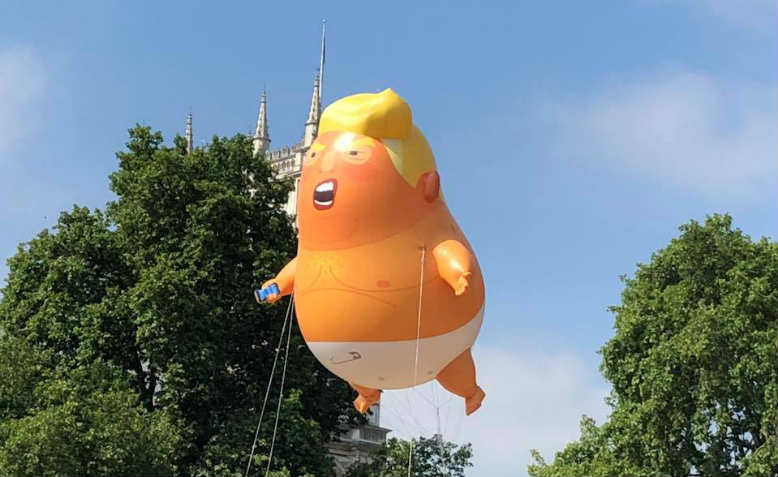 Trump baby flying in Parliament Square, Friday 13th July. Photo: Shabbir Lakha
Trump baby flying in Parliament Square, Friday 13th July. Photo: Shabbir Lakha
Looking back at the quarter of a million strong demonstration against Trump, Daniel Jakopovich argues that it was a mass display of people power
The national demonstration against Trump on the streets of London was a remarkable display of determination against the hateful brutality of Trump’s extremist, warmongering, racist, sexist and environmentally reckless presidency. In just the first year of Trump in office, the US dropped more than half the number of bombs that were dropped in the entire eight years of the Bush administration. He also introduced a ban targeting people from eight predominantly Muslim countries. He trampled over Palestinian rights, is on a war path with Iran (having ended the nuclear deal with that country), and has been pushing for a US invasion of Venezuela.
The broad coalition Together Against Trump gathered an estimated 250,000 protesters on a weekday, making it one of the biggest demonstrations in Britain since the anti-Bush demonstration in November 2003. People came to the protest from across the country on over a hundred coaches.
A large number of organised blocs also took part, including the Trumpets against Trump bloc, Refugee bloc, Jewish bloc, Student bloc, Latin America against Trump bloc, Turkish & Kurdish bloc, Free Palestine bloc, Green bloc, Climate bloc, London Young Labour bloc, Labour Students bloc, No to Torture bloc, Muslim women bloc, Vegans against Trump bloc, Migrant solidarity bloc, Handmaids against Trump, and others. As one of the organisers of the demonstration, Stop the War Coalition was also out in force.
The enormous march moved through central London to culminate in a mass assembly at Trafalgar Square. The size of the protest meant that the square wasn’t big enough to contain all of the marchers, as a result of which the nearby streets were also filled with protesters.
A broad range of campaigners, trade unionists, politicians and community representatives addressed the rally, united in their rejection of Trump’s divisive, hateful politics. Among the speakers was Labour leader Jeremy Corbyn, who (among other things) stated: “When somebody on a global stage condemns Muslims because they’re Muslims, it’s not acceptable and we will call it out.” He summed up the motive behind this mass gathering of people by noting that we face crucial choices “about our planet, our world, and how we relate to each other. (…) When we divide ourselves by hatred, at the end of the day we all lose. When you unite together with common objectives, we can all win”.
Stop the War convenor Lindsey German pointed out that “there is no point in appeasing the far right and that is what the British government is doing. We do not accept Trump’s ideas, we do not accept his scapegoating of migrants, we do not accept the scapegoating of Muslims, we do not accept his militarism, so cut out the appeasement. This isn’t just about Trump – this is about the future of our society”.
Trump had recognised in advance that his message of greed and division was not welcome in Britain, which is why he hid from the people in distant mansions and castles throughout his stay in Britain. Tens of thousands of people also demonstrated in around 50 towns and cities across the country, and protests followed Trump wherever he went: at Blenheim Palace, at Chequers, at Windsor, and across Scotland as well.
The enormous scale of the demonstration against Trump greatly weakens Theresa May’s effort to legitimise her pro-war “special relationship” with his far right administration. As a mass assertion of progressive values and progressive politics, it is also a powerful response to the ongoing attempt to construct a fascist movement in Britain, which is being funded and supported by US political forces close to Trump. International coverage of the mass protests in Britain also will have inspired opposition to the Trump administration in other countries.
The mass mobilisation against Trump’s reactionary politics has shown how we can effectively challenge the “special relationship” with the US regime and put an end to the brutal pro-war government in Britain. By building people power we are laying the foundation for a new, more peaceful and humane world.

